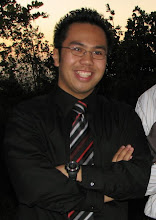3.13.2010
Mile 1036: Games People Play
"SEEING IT FROM WHERE I STAND
NOTHING COMES EASY."
From the theme song to the 1990s sitcom Just the Ten of Us.
2008. A group of 10 of us students sits in a small room on our first day of the Behavioral Sciences Lab. There's a huge table in the middle of the room which we all are sitting around. We're staring at each other, probably making small talk... but we're waiting. A Dominican lady walks in, along with one of our faculty, and they sit at the table. I find myself in the chair directly to the right of them, as they prepare the class. And when they asked for a volunteer to interview the Dominican lady (a patient, standardized most of the time, if not always), I had raised my hand. A form with questions to ask was handed to me, and soon I found myself going through the form to take the Dominican's history.
However, I knew that soon enough - just like the training wheels on the bicycle - I needed to be free of support to know I could really do this on my own.
---
We're finished with the babies, at least in terms of a full-time sense. As I've crossed the 1000 mile mark on this part of the adventure, we've moved from the hospital setting to a private practice in Buffalo Grove. Here's the dilemma I'm facing - how to take a history from a pediatric patient. Even though I've been through many experiences with history taking - starting with standardized days of yore - it feels different when I'm in with real patients with real health issues. I just don't want to mess up.
I'll admit during my first few days, I've felt nervous about taking histories and physical exams, but when I had talked to my attending doctor, he said that experience comes with practice. From what I've seen so far, I think there's three hoops to leap through to get an accurate history and physical exam in pediatrics:
1. The Kid's Trust
2. The Parents Trust
3. The Kid's Communication
One of my group mates brought up an excellent idea on why I might be having trouble: why don't I try playing a few games to start to earn some of the kid's trust. No, I didn't pull any of the following things on 19-year-olds but I did try them on some of my younger patients. For instance, with an infant, I soon made my hand into an airplane to try to make the kid smile. The benefits were enormous though as the kid showed teeth! I knew I had made the little one comfortable for the ride.
However, it's not over yet, as many kids come in with concerned parents. And I've seen them all, from the laid back, leave the son/daughter in control mom/dad to the stern, "I don't any students in the room" mom/dad. Parents are an important part of the health of the kid, and from what I've learned so far, as physicians, we're not here to override what parents are thinking, but to help and assist them with their children. The cool part is that pediatric histories may include a combination of information from the mom/dad and the patient himself/herself (both will answer your questions). It's up to the clinician on how to interpret any differences (which occur often!) between the two.
I also am learning how kids love to term how they feel. Some instances were an unending "stream" of yes's to a line of questions I asked one patient. Other times, I found myself trying to interpret what "weird" or "tickle" meant. The words are cute, but in order to help out the kid, I had to probe what exactly those words meant. I'd love it when a kid would clear up how "weird" something was by saying, it was just "weird." It's just another piece to try to put into the puzzle.
I guess jumping through hoops may be right up my alley.
Labels:
communication,
history,
parents,
Pediatrics
Subscribe to:
Post Comments (Atom)



No comments:
Post a Comment